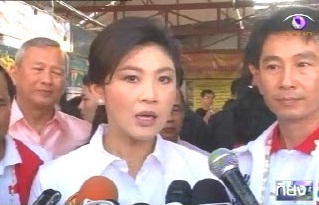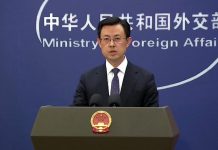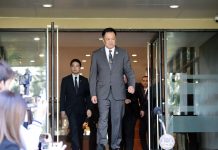CHIANG MAI, May 12– Thai Prime Minister Yingluck Shinawatra on Saturday said the government would apply its utmost efforts to contest the Preah Vihear case at the International Court of Justice, pledging to protect Thailand’s sovereignty.
During the Chiang Mai’s by-election campaign, Ms Yingluck said that she– together with Deputy Prime Minister Gen Yutthasak Sasiprapa, military top brass, officials of foreign ministry– on Thursday met with the legal team for the case, to learn, discuss and clarify relevant information in preparation for contesting the case against Cambodia at the ICJ.

The Thai-commissioned legal team included the Thai ambassador to the Hague, Virachai Plasai, head lawyer of the case team, and three foreign lawyers from France, Canada and Australia.
In April 2011, Cambodia asked the ICJ to clarify and interpret its 1962 ruling on Preah Vihear.
In 1962 the court ruled the ancient Hindu temple belonged to Cambodia but did not define the boundaries of the area surrounding the structure, which has led to sporadic clashes between troops of both sides since then.
The ICJ has asked Thailand to submit further written explanations by June 21, as Cambodia has reportedly already sent its written explanations to the court, which set a deadline for Cambodia on March 8.
The prime minister also said that the team of lawyers would work together with related committees, affirming the government would do its best in every way to fight the case.
Regarding the dispute over a 4.6 square kilometres area around the Preah Vihear temple, Ms Yingluck vowed that the government is applying the utmost attempts to protect the country’s sovereignty.
The premier denied giving any details related to the case, explaining that the information was a legal matter.
However, she affirmed that every move by the government would work closely with the legal team, saying that the government would gather relevant experts for the legal battle of this case.
The UN court last July ordered both Thailand and Cambodia to immediately withdraw their military personnel now present in the provisional demilitarised zone and refrain from any military presence within that zone, while urging both countries to work with the Association of Southeast Asian Nations (ASEAN) to reach an agreement allowing the regional bloc’s observers to enter the disputed zone.
The two countries were also ordered to revive their stalled talks to resolve the conflicts. Both must report developments to the court until a decision on Cambodia’s main request for interpretation of the 1962 order is finalised.




